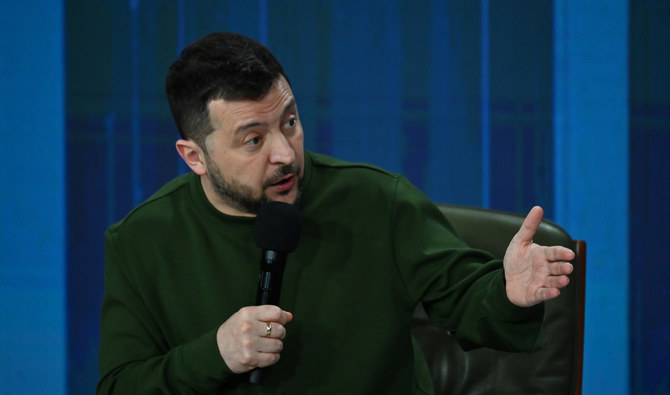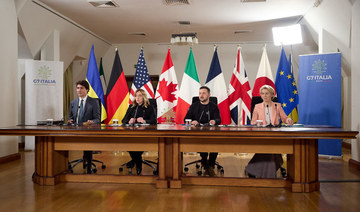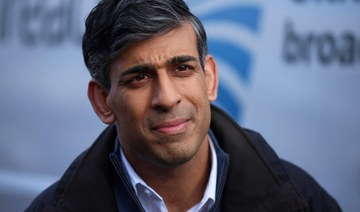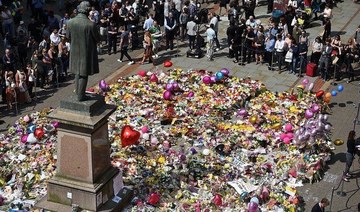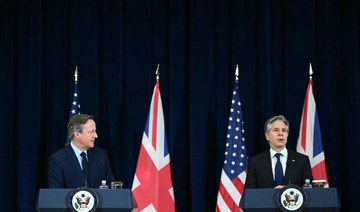KYIV: Ukrainian President Volodymyr Zelensky said Sunday his country’s victory “depends” on support from the West and expressed hope the United States would approve a critical package of military aid.
In a rare acknowledgement of setbacks, Zelensky said 31,000 Ukrainian soldiers had been killed in the war and that plans for last summer’s failed counteroffensive had been leaked to Russia.
He appealed to the West to boost Ukraine’s war chances, at a forum marking the second anniversary of Russia’s invasion.
“Whether Ukraine will lose, whether it will be very difficult for us, and whether there will be a large number of casualties depends on you, on our partners, on the Western world,” Zelensky said.
Ukraine has in recent weeks been weakened by an ammunition shortage, with a vital $60-billion US aid package blocked by political wrangling in the US Congress.
The Ukrainian president said that “there is hope for Congress, and I am sure that it is going to be positive.”
Ukraine has for months said that Western aid is too slow coming and that the hold-ups have real consequences as the war against Russia enters its third year.
Zelensky for the first time suggested that Russia had prior information on the country’s much-anticipated but unsuccessful counteroffensive last summer.
“Action plans were on the Kremlin’s table before the counteroffensive actions began,” said the president, who this month sacked the army’s commander-in-chief Valery Zaluzhny.
Zelensky said that Ukraine’s war losses were nevertheless much lower than Russia has claimed.
He said: “31,000 Ukrainian soldiers have died in this war. Not 300,000 or 150,000, or whatever Putin and his lying circle are saying.”
In December, Russian Defense Minister Sergei Shoigu said 383,000 Ukrainian soldiers had been killed or injured.
The second anniversary of the war was marked around the world with moving tributes.
During a Sunday service in the Vatican, Pope Francis called for intensified efforts to find a “just and lasting peace” to the conflict.
“There have been so many victims, so many wounded, so much destruction, so much anguish and so many tears over what has become a terribly long period — the end of which we cannot yet foresee,” he said.
But the focus in Kyiv was on shoring up Western support.
Ukraine Defense Minister Rustem Umerov said earlier Sunday that half of Western military aid to Kyiv was delivered later than promised, causing losses.
Europe has admitted it will fall far short of a plan to deliver more than one million artillery shells to the country by March, instead hoping to complete the shipments by the end of the year.
Such delays meant Kyiv would “lose people, lose territories,” especially given Russia’s “air superiority,” said Umerov.
“We do everything possible and impossible but without timely supply it harms us,” he said.
US President Joe Biden has said the hold-ups directly contributed to Ukraine being forced to withdraw from the frontline town of Avdiivka earlier in February — handing Russia its first territorial gain in almost a year.
Zelensky had pressed G7 leaders on Saturday to ensure the fast delivery of weapons, telling them: “Putin can lose this war” and “we will win.”
But, after a year of static frontlines, Russia has in recent weeks been seeking to press its advantage on the battlefield and try to advance beyond Avdiivka.
“Despite the difficult situation, our soldiers courageously hold their lines and positions,” Ukraine’s commander-in-chief, Oleksandr Syrsky, said Sunday after visiting frontline command posts.
Russia marked the start of the war’s third year with a wave of overnight missile and drone attacks.
A missile strike on the eastern city of Kostyantynivka wounded one, destroyed the railway station — which is not in use — along with dozens of apartments, shops and administrative buildings, Ukrainian authorities said.
Explosives dropped by a Russian drone killed a 57-year-old man in Nikopol, across the Dnipro river from the Zaporizhzhia nuclear power plant, captured by Russia at the start of the war.
Umerov said Russia had fired more than 8,000 missiles at his country since the start of the invasion — an average of more than 10 a day.
Visiting the southern city of Mykolaiv, Annalena Baerbock, Germany’s foreign minister, pledged an additional 100 million euros ($108 million) in humanitarian aid to Kyiv.
“We should not minimize this aid as being in vain — it saves lives every day,” she said, standing in front of a building destroyed by Russian strikes on the city.
French President Emmanuel Macron will on Monday host a summit European leaders at the Elysees Palace in Paris to try to strengthen Western support for Ukraine.
German Chancellor Olaf Scholz and Polish President Andrzej Duda will be among some 20 European leaders attending the conference, which will open with a video address from Zelensky.



